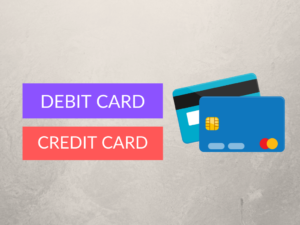The Difference Between Credit Cards and Debit Cards
Using plastic money has become a common practice in the modern world. Credit cards and debit cards are widely used for various financial transactions. However, these two types of cards differ in terms of functionality and usage. In this article, we will explore the key differences between credit cards and debit cards, as well as their uses and examples.
What is a Credit Card?
A credit card is a payment card issued by a financial institution that enables cardholders to borrow funds to make purchases. The issuers of credit cards set a credit limit, which represents the maximum amount the cardholder can borrow. Credit cards allow users to make purchases on credit, and they are required to pay back the borrowed amount plus any applicable interest.
Examples of Credit Cards:
- Visa
- Mastercard
- American Express
- Discover
Uses of Credit Cards:
Credit cards offer users various advantages:
- Convenient payment method for online and in-store purchases.
- Ability to make large purchases and pay them off over time.
- Opportunity to earn rewards, such as cash back or travel points.
- Access to additional benefits like purchase protection and extended warranties.
What is a Debit Card?
A debit card, on the other hand, is connected directly to the cardholder’s bank account. When using a debit card, the funds are immediately deducted from the account, eliminating the need to repay borrowed money. Debit cards provide a convenient way to access funds without carrying cash.
Examples of Debit Cards:
- Maestro
- Visa Debit
- Mastercard Debit
- American Express Serve
Uses of Debit Cards:
Debit cards offer several advantages:
- Ability to withdraw cash from ATMs.
- Quick and easy access to funds for purchases.
- No interest charges or debt accumulation.
- Can be used internationally in many cases.
Differences between Credit Cards and Debit Cards:
| Difference Area | Credit Card | Debit Card |
|---|---|---|
| Payment Method | Credit purchases; borrow money from the card issuer. | Payment directly from the linked bank account. |
| Mandatory Repayment | Required to pay back borrowed money plus interest (if applicable). | No repayment needed; use of available funds only. |
| Access to Credit | Credit limit determines the amount that can be borrowed. | No credit limit; limited to available balance in the linked account. |
| Interest Charges | Accrue interest on the carried-over balance if not paid in full. | No interest charges as the money is already deducted from the account. |
| Transaction Fees | May include transaction fees for cash advances or foreign transactions. | Minimal transaction fees for certain services, such as ATM withdrawals. |
| Debt Accumulation | Using a credit card can lead to debt accumulation. | No potential for debt accumulation as spending is limited to available funds. |
| Rewards and Benefits | Credit cards often offer reward programs and additional benefits. | Debit cards may provide limited rewards but fewer additional benefits. |
| Financial Responsibility | Requires responsible borrowing and repayment practices. | Encourages responsible financial management without borrowing. |
| Building Credit History | Using credit cards responsibly can help build a positive credit history. | No impact on credit history as it does not involve borrowing. |
| Availability | Requires approval from the card issuer; creditworthiness may be evaluated. | Directly linked to a personal bank account, easily obtained. |
Conclusion:
In summary, credit cards and debit cards differ significantly in terms of functionality, repayment obligations, access to credit, and financial responsibility. Credit cards involve borrowing money with interest, while debit cards provide direct access to available funds in a bank account. Understanding these differences can help individuals make informed decisions about which card type is most suitable for their financial needs and goals.
People Also Ask:
Here are five common questions about credit cards and debit cards:
1. Can I use a credit card like a debit card?
No, credit cards and debit cards have different mechanisms of payment. While debit cards deduct funds directly from a linked bank account, credit cards allow users to borrow money from the issuer.
2. Does a credit card help build credit?
Yes, using a credit card responsibly and making timely payments can contribute to building a positive credit history.
3. Can I withdraw cash with a debit card?
Yes, debit cards can be used to withdraw cash from ATMs, provided there are sufficient funds available in the linked bank account.
4. Are debit cards safer than credit cards?
Both credit cards and debit cards have security measures in place, but potential losses may be greater with credit cards as fraudulent charges are subject to a credit limit.
5. Can I get a refund on a credit card purchase?
Yes, credit card purchases are often eligible for refunds. The refund amount is typically credited back to the same credit card.


